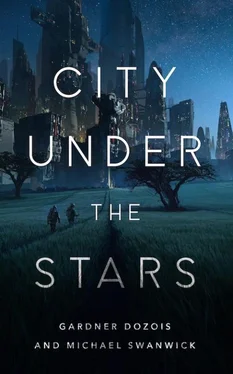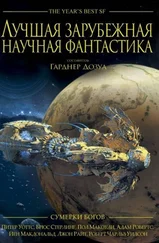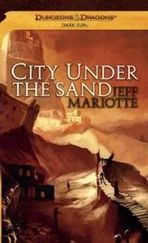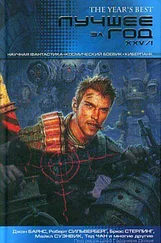The whistle hooted once, and Brigault went up to relieve the captain. In a moment, Willis came back along the spine, massaging the tension out of his shoulder. He squatted down next to Hanson. He was still carrying the rifle; on caravan, it was chained to his wrist, and it never left him—he even slept with it. It was nearly irreplaceable, and worth more than some of the cargo. That reminded Hanson of Oristano’s revolver, wrapped heavily in oilskin and hidden in Hanson’s pouch—Gossard’s idea; he’d never’ve had the presence of mind to think of it. Stealing the revolver was alone enough to earn him the death penalty; in fact it was probably a more serious offense than the killing of Oristano. Thinking that, Hanson smiled. They could only hang him once, after all.
He greeted the captain, and they talked of the trivial things people talk of when something is making them uncomfortable in each other’s presence. Imperceptibly, Willis edged the conversation around, and, after a while, Hanson realized that Willis was fishing for more information on why he was leaving Orange. To get the ride, he’d told Willis a compendium of half-truths about being laid off and blacklisted, and that he was leaving, simply, to survive. Willis knew of the enmity between Oristano and Hanson, and the tale was credible enough, except for Hanson’s desire to leave Orange immediately , with only the clothes on his back. He had explained that away as a desire to avoid possible further prosecution by Oristano—since, as a blacklistee, he was outside the law and anyone could do anything at all to him with perfect impunity from the State—and the fact that he stood a better chance of getting a ride from Willis than from another captain. It was a good story, but Hanson was a poor liar, and Willis was very sharp. Hanson had no way of knowing how much of the story Willis believed, if he believed any of it.
“So what will you do now?” Willis asked. “You have any plans at all?”
“No,” Hanson said, “just to get out of Orange, is all. I a’n’t got a chance in Hell there. Upcountry, at least maybe I can get some kind of piss-ass job, someway. Don’t know what, but I’m a dead man if I stay.”
“Ayah,” Willis said, “that’s true, right enough.” He sighed. He was a tall, lanky man, about ten years older than Hanson, with a face like a weathered stone hatchet. His hair was heavily streaked with gray, but he held his squatting position effortlessly, rocking slightly heel-to-toe to balance against the motion of the transport. He turned his head and stared steadily at Hanson. He had an intricate, compassionate face, but it was a grim one nevertheless—there was something unshakable in it, as cold and hard as flint. It was a face of a man accustomed to command and in the habit of depending on no one or nothing other than himself. “That’s true,” he repeated musingly. He shrugged, and ponderously aimed his face away from Hanson, as if it was very heavy and moved on hinges. But his eyes flicked back again. His eyes were a restless, glittering black, like those of a magpie or an ancient crow. They would fix on something, absorb it completely, flick to something else. “What was it you said you got canned for?” he asked.
“Didn’t say,” Hanson said. Then he told him, making it up as he went along. He wasn’t very good at this sort of thing, and he had the feeling that he was floundering in deeper and deeper. Probably he had contradicted himself a half dozen times already; it was hard to remember what he’d said even a moment ago. He was numb and confused and deeply sad, and that desperate, hysterical depression was building up again—he could feel it crying and yammering inside his belly, like a little trapped animal. He finished his story and sat resignedly, waiting to see if Willis was going to challenge him on it.
“Ayah,” Willis said at last, “a bad thing.” His eyes flicked away from Hanson, flicked back, flicked away. “A shame and a Goddamned waste,” he said. “Piss your life away—” He stopped, sighed, scratched his ear with his finger, sighed again. After a long pause he said, “Making good time tonight.”
“Ai,” Hanson said.
“Ayah,” Willis said.
They fell silent.
Another caravan was coming down the highway toward them, probably headed south to Orange. This one was hauled by one of the clumsy steam-tractors, puffing and clattering horrendously, belching fire-shot clouds of black smoke, its great pistons thudding back and forth. It sounded like a giant’s sackful of pots and plates being dragged across rocky ground. The two big vehicles hooted at each other as they passed. The sound rolled wistfully around the low hills until it was blotted up by the thick pine woods. Willis shifted position restlessly. He ran a hand up through his graying hair, brought it down to tug at his earlobe, but didn’t say anything after all. Hanson was aware that Willis was wrestling with some complex emotion, but there was no way to tell exactly what it was. They sat silently while the transport clicked up a slight rise. To the west, the country opened out into extensive piney woods, but to the east, Hanson knew, there was nothing but five or six miles of low, weed-overgrown rubble, the tangled ruins of broken Utopian buildings, inhabited only by coyotes, chimeras—sports too gene-scrambled even to be regarded as human—and abandoned children who had grown up completely feral. Even the bandits preferred to camp in the woods usually. It was safer there, in spite of the wolves and the killercatchers.
Then they topped the rise and they could see the Wall itself, immense, smoldering with pinks and coral-reds, burning without flame: the Wall of the City of God. Running roughly parallel with the highway here, only five miles away, it looked almost close enough to touch. But your hand would burn, Hanson thought. It would surely burn.
“Lookit that, now,” Willis said.
“Ai,” Hanson said, mistaking the emotion in Willis’s voice. His own heart had thudded painfully at first sight of it, and his breath had sucked in, in spite of himself. “It’s very beautiful.”
Willis turned to look at Hanson. His eyes had slitted up and somehow, subtly, he seemed to be crouching now, where before he had been merely squatting. He stared long and intently at Hanson. Then he made a small disgusted sound in his throat and turned back to look at the Wall. His eyes had widened, and the radiance of the Wall was reflected in them in tiny burning highlights. When he spoke again, his voice was flat and hard. “I hate it,” he said. And he spat, emphatically, in the direction of the Wall. And he got up and walked back to the cab, without another word.
Hanson sat up awhile, trying to puzzle it out. But exhaustion, long denied, rolled over him like a mountain coming down, and he tied himself to a stanchion with his belt, and he went to sleep.
He awoke briefly as they were crossing the Passaic, and he realized that the sound of the whistle signaling to the SI garrison had been wailing through his dreams. He had pictured it as the cry of a huge black bird, wings wide, falling blind through the encrusted and ornamental air. Then his head lolled, and he slept.
He woke again, later, surrounded by motion and blackness. The Wall still blazed across the world, burning its image into the jelly of his retinas. He closed his eyes against the light.
And opened them again at dawn. They were in the process of crossing the Hudson, at Montgomerytown, where a bridge had survived enough intact to be capable of repair by the artisans of the Great Restoration. The Wall was no longer visible, though afterimages of it seemed to smolder in Hanson’s still sleep-fogged mind. It had begun its great slow curve east of north, crossing the Hudson below Ossining—cutting straight across the water, the river disappearing under the Wall and out of the knowledge of men. Some said that the river met the sea at last, behind the Wall, inside the City of God. But no one Hanson knew had ever seen the ocean—with the possible exception of Willis—and it was a thing as impossible to picture as the City itself. Occasionally a fishing-boat or a canoe would be swept under the Wall by the current, but the crews never returned, and the river kept its secret.
Читать дальше












